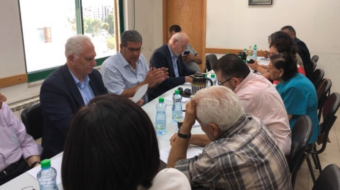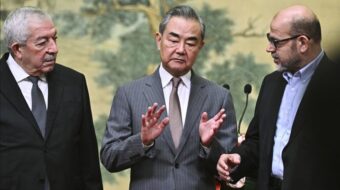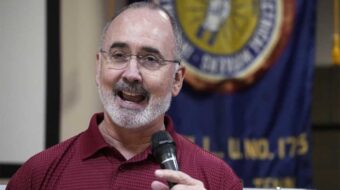The ouster of democratically-elected President Jean-Bertrand Aristide by a U.S.-sponsored coup has plunged Haiti into chaos, with right-wing death squads unleashing a campaign of terror and bloodletting against Aristide supporters across the country.
Vigilantes and paramilitary troops are reportedly executing members of Aristide’s Fanmi Lavalas movement in the streets. Witnesses say uniformed police, former right-wing military leaders, and armed civilians are cruising the streets in sports-utility vehicles, rounding up and killing people loyal to the president.
Guy Philippe, the self-appointed “military chief” of the coup, recently told the Miami Herald the person he admires most is Gen. Augusto Pinochet, who led the 1973 coup against Salvador Allende in Chile. Pinochet ordered the torture, execution and disappearance of thousands of Chilean trade unionists and democrats. Number two on Philippe’s heroes list is Ronald Reagan.
Heavily armed U.S. Marines seized Aristide and family members at their home in the dead of night Feb. 29 and escorted them to a waiting U.S.-owned Boeing 757. They were flown to Bangui in the Central African Republic against their will. The Haitian president managed to telephone Rep. Maxine Waters (D-Calif.), TransAfrica founder and longtime friend Randall Robinson, and news organizations later that day to say he had been “kidnapped” by U.S. forces and was the victim of a coup.
In a brief radio broadcast, Aristide said those who ousted him had “cut down the tree of peace,” but “it will grow again.” He has been held incommunicado by French security forces in Bangui ever since.
A temporary government was set up by the U.S. and Haiti’s wealthy elite with Boniface Alexandre, head of Haiti’s Supreme Court, as president, although his installment lacks the constitutionally-required approval of the legislature. Aristide remains the duly elected president, having received 92 percent of the vote in 2000.
Meanwhile Philippe and military death-squad leader and convicted murderer Louis Jodel Chamblain are reportedly conducting deadly reprisals against Aristide supporters in the capital, Port-au-Prince. Laura Flynn, a former aide to Aristide, said on the Bay Area’s KPFA radio station that many neighborhoods, including Bel Air, are resisting the terror by putting up barricades for self defense.
Vice President Dick Cheney told Fox News Channel on March 2 that Aristide had “worn out his welcome. … He was democratically elected but he didn’t govern in a democratic manner.” President Bush had signaled previously that Aristide should be shoved out.
Pierre Labossiere, founder of the Bay Area’s Haiti Action Committee, said, “Aristide should be returned to Haiti immediately.” He told the San Francisco Chronicle, “The people of Haiti were not trying to build nuclear weapons. All they were doing was building schools.”
The U.S. Coast Guard has turned back at least 867 Haitians who have sought to flee the country since Feb. 21. Haitian solidarity activists have called for the U.S. to give asylum to the refugees, since returning them to Haiti puts them at the mercy of the paramilitary gangs.
The coup in Haiti culminates a three-year destabilization campaign engineered by the Bush administration. The campaign involved a U.S.-imposed block on $500 million in economic and humanitarian aid, secret financing of the Big Business-connected opposition (the so-called “Democratic Convergence” and others), a massive disinformation campaign against Aristide, U.S. arming of the rebels, and finally sending U.S. Marines to escort Aristide out at gunpoint. At least 2,000 additional U.S. troops are set to arrive soon.
Rep. Charles Rangel (D-N.Y.) of the Congressional Black Caucus told ABC News the U.S. government is “just as much a part of this coup d’état as the rebels, looters, or anyone else.” Civil rights leader Jesse Jackson has called for a congressional investigation of the role of the U.S., specifically the CIA, in the coup.
Multi-year economic sanctions imposed by the U.S., World Bank, and International Monetary Fund severely crippled Aristide’s government, and undoubtedly undermined some of its popular support. Haiti, a country of 8 million people, is the poorest in the Western Hemisphere, with an average income of less than $1 per day.
Nonetheless, hundreds of thousands of people rallied in support of the embattled president in the months prior to the coup, including at the 200th anniversary celebrations of the first Black republic on Jan. 1.
Despite making some concessions to the IMF, Aristide refused to completely give away the store, stopping short of wholesale privatization of the nation’s resources and infrastructure. He succeeded in allocating state funds to building schools and clinics. This made him an enemy of Haiti’s privileged elite and a marked man in the eyes of Washington and Wall Street.
The coup against Aristide follows decades of U.S. meddling in the affairs of the Caribbean and Latin America, including the U.S. invasions of Grenada in 1983 and Panama in 1989. Peace and justice activists say this new act of “preemptive regime change” significantly increases the danger of U.S. intervention in Cuba, Venezuela, and elsewhere.
The author can be reached at malmberg@pww.org.












Comments